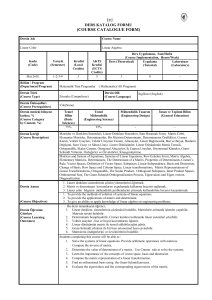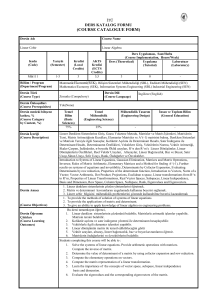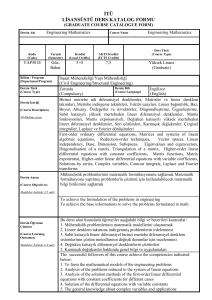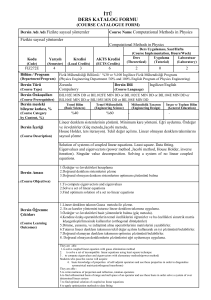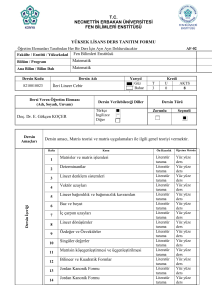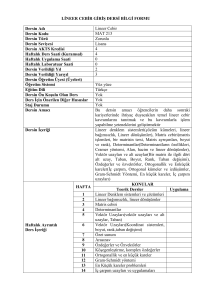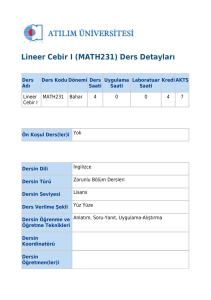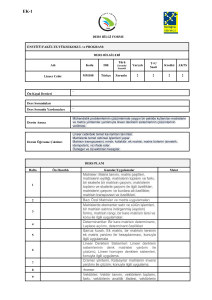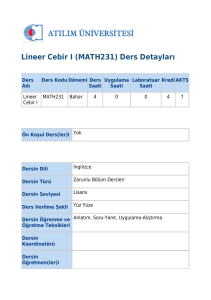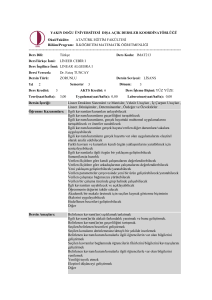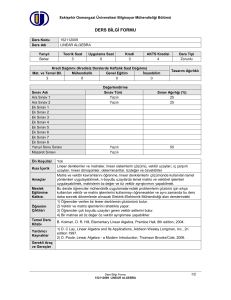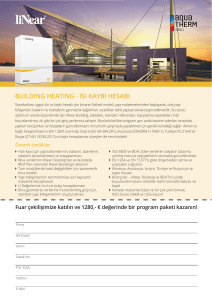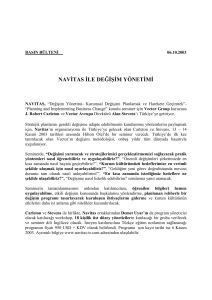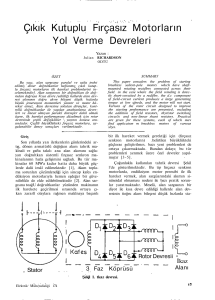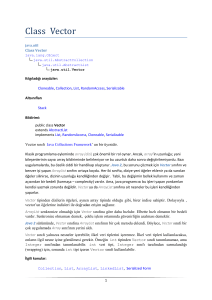İTÜ-KKTC
advertisement
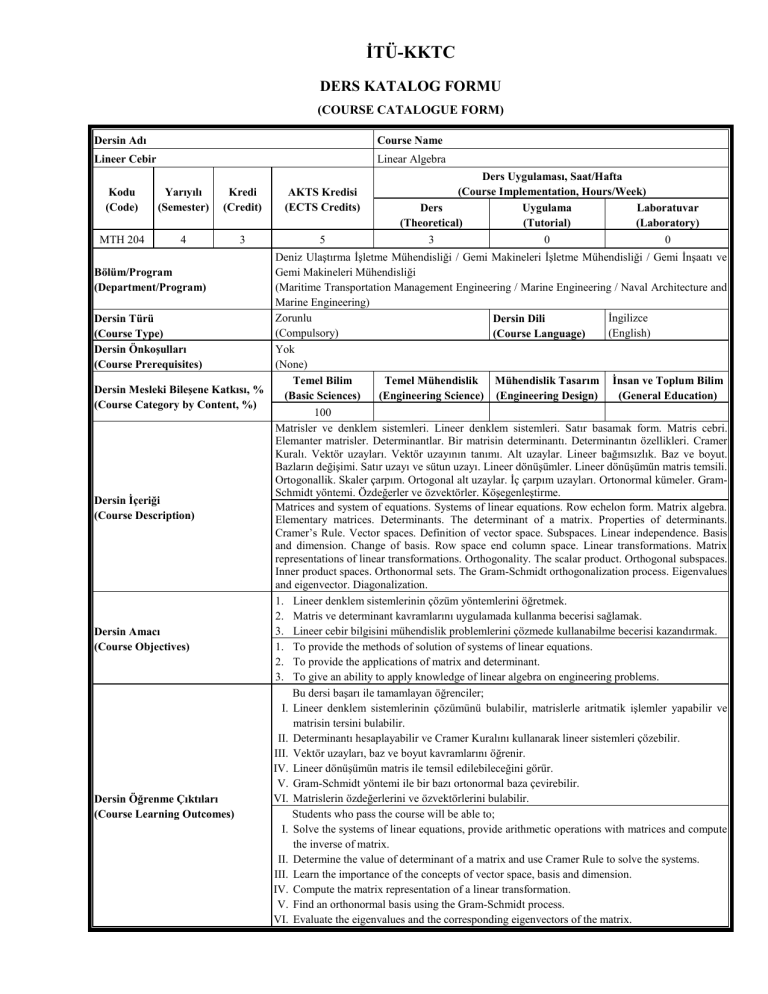
İTÜ-KKTC DERS KATALOG FORMU (COURSE CATALOGUE FORM) Dersin Adı Course Name Lineer Cebir Linear Algebra Kodu (Code) Yarıyılı (Semester) Kredi (Credit) MTH 204 4 3 Bölüm/Program (Department/Program) Dersin Türü (Course Type) Dersin Önkoşulları (Course Prerequisites) Dersin Mesleki Bileşene Katkısı, % (Course Category by Content, %) Dersin İçeriği (Course Description) Dersin Amacı (Course Objectives) Dersin Öğrenme Çıktıları (Course Learning Outcomes) AKTS Kredisi (ECTS Credits) 5 Ders Uygulaması, Saat/Hafta (Course Implementation, Hours/Week) Ders Uygulama Laboratuvar (Theoretical) (Tutorial) (Laboratory) 3 0 0 Deniz Ulaştırma İşletme Mühendisliği / Gemi Makineleri İşletme Mühendisliği / Gemi İnşaatı ve Gemi Makineleri Mühendisliği (Maritime Transportation Management Engineering / Marine Engineering / Naval Architecture and Marine Engineering) Zorunlu İngilizce Dersin Dili (Compulsory) (English) (Course Language) Yok (None) Temel Bilim Temel Mühendislik Mühendislik Tasarım İnsan ve Toplum Bilim (Basic Sciences) (Engineering Science) (Engineering Design) (General Education) 100 Matrisler ve denklem sistemleri. Lineer denklem sistemleri. Satır basamak form. Matris cebri. Elemanter matrisler. Determinantlar. Bir matrisin determinantı. Determinantın özellikleri. Cramer Kuralı. Vektör uzayları. Vektör uzayının tanımı. Alt uzaylar. Lineer bağımsızlık. Baz ve boyut. Bazların değişimi. Satır uzayı ve sütun uzayı. Lineer dönüşümler. Lineer dönüşümün matris temsili. Ortogonallik. Skaler çarpım. Ortogonal alt uzaylar. İç çarpım uzayları. Ortonormal kümeler. GramSchmidt yöntemi. Özdeğerler ve özvektörler. Köşegenleştirme. Matrices and system of equations. Systems of linear equations. Row echelon form. Matrix algebra. Elementary matrices. Determinants. The determinant of a matrix. Properties of determinants. Cramer’s Rule. Vector spaces. Definition of vector space. Subspaces. Linear independence. Basis and dimension. Change of basis. Row space end column space. Linear transformations. Matrix representations of linear transformations. Orthogonality. The scalar product. Orthogonal subspaces. Inner product spaces. Orthonormal sets. The Gram-Schmidt orthogonalization process. Eigenvalues and eigenvector. Diagonalization. 1. Lineer denklem sistemlerinin çözüm yöntemlerini öğretmek. 2. Matris ve determinant kavramlarını uygulamada kullanma becerisi sağlamak. 3. Lineer cebir bilgisini mühendislik problemlerini çözmede kullanabilme becerisi kazandırmak. 1. To provide the methods of solution of systems of linear equations. 2. To provide the applications of matrix and determinant. 3. To give an ability to apply knowledge of linear algebra on engineering problems. Bu dersi başarı ile tamamlayan öğrenciler; I. Lineer denklem sistemlerinin çözümünü bulabilir, matrislerle aritmatik işlemler yapabilir ve matrisin tersini bulabilir. II. Determinantı hesaplayabilir ve Cramer Kuralını kullanarak lineer sistemleri çözebilir. III. Vektör uzayları, baz ve boyut kavramlarını öğrenir. IV. Lineer dönüşümün matris ile temsil edilebileceğini görür. V. Gram-Schmidt yöntemi ile bir bazı ortonormal baza çevirebilir. VI. Matrislerin özdeğerlerini ve özvektörlerini bulabilir. Students who pass the course will be able to; I. Solve the systems of linear equations, provide arithmetic operations with matrices and compute the inverse of matrix. II. Determine the value of determinant of a matrix and use Cramer Rule to solve the systems. III. Learn the importance of the concepts of vector space, basis and dimension. IV. Compute the matrix representation of a linear transformation. V. Find an orthonormal basis using the Gram-Schmidt process. VI. Evaluate the eigenvalues and the corresponding eigenvectors of the matrix. Ders Kitabı (Textbook) Diğer Kaynaklar (Other References) Steven J. Leon, Linear Algebra with Applications, Pearson Education International, 2002. 1. Bernard Kolman - David R. Hill, Introductory Linear Algebra an Applied First Course, Pearson Education International, 2005. 2. Cevdet Cerit, Çözümlü Lineer Cebir Problemleri, 2007. 5 ödev Ödev ve Projeler (Homework and Projects) 5 homeworks Laboratuvar Uygulamaları (Laboratory Work) Bilgisayar Kullanımı (Computer Use) Diğer Uygulamalar (Other Activities) Başarı Değerlendirme Sistemi (Assessment Criteria) Faaliyetler (Activities) Yıl İçi Sınavları (Midterm Exams) Kısa Sınavlar (Quizzes) Ödevler (Homework) Projeler (Projects) Dönem Ödevi/Projesi (Term Paper/Project) Laboratuvar Uygulaması (Laboratory Work) Diğer Uygulamalar (Other Activities) Final Sınavı (Final Exam) Adedi (Quantity) Değerlendirmedeki Katkısı, % (Effects on Grading, %) 1 40 5 10 1 50 DERS PLANI Hafta Konular Ders Çıktıları 1 Lineer denklemler ve matrisler I 2 Lineer denklemler ve matrisler I 3 Lineer denklemler ve matrisler I 4 Determinantlar II 5 Determinantlar ve vektör uzayları 6 Vektör uzayları III 7 Vektör uzayları III 8 Vektör uzayları III 9 Vektör uzayları ve lineer dönüşümler 10 Lineer dönüşümler IV 11 Özdeğerler ve özvektörler VI 12 Özdeğerler, özvektörler ve ortogonallik 13 Ortogonallik V 14 Ortogonallik V II-III III-IV V-VI 15 COURSE PLAN Weeks Topics Course Outcomes 1 Matrices and systems of equations I 2 Matrices and systems of equations I 3 Matrices and systems of equations I 4 Determinants II 5 Determinants and vector space 6 Vector space III 7 Vector space III 8 Vector space III 9 Vector space and linear transformations 10 Linear transformations 11 Eigenvalues and eigenvectors 12 Eigenvalues, eigenvectors and orthogonality 13 Orthogonality V 14 Orthogonality V 15 II-III III-IV IV VI V-VI Dersin Deniz Ulaştırma İşletme Mühendisliği Programıyla İlişkisi Katkı Seviyesi Programın Mezuna Kazandıracağı Bilgi ve Beceriler (Programa İlişkin Çıktılar) 1 a Matematik, fen ve mühendislik bilgilerini uygulama becerisi b Deney tasarlama, deney yapma, veri toplama, sonuçları analiz etme ve yorumlama becerisi c Gereksinime yönelik bir sistemi, parçayı veya süreci ekonomik, çevresel, sosyal, politik, etik, sağlık ve emniyet, üretilebilirlik ve sürdürülebilirlik gibi gerçekçi kısıtlamalar altında tasarlayabilme becerisi d Çok disiplinli takım çalışması yürütebilme becerisi e Mühendislik problemlerini belirleme, formüle etme ve çözme becerisi f Mesleki ve etik sorumluluklara sahip olma bilinci g Etkin iletişim kurabilme becerisi h Mühendislik çözümlerinin etkilerini küresel, ekonomik, çevresel ve toplumsal çerçevede anlama becerisi i Yaşam boyu öğrenme gereksinimini kavrama ve bunu uygulama yeteneği j Güncel/çağdaş konulara ilişkin bilgi sahibi olma k Mühendislik için gerekli teknikleri ve modern cihazları kullanabilme becerisi 1: Az, 2: Kısmi, 2 3 X X X X X 3: Tam Relationship between the Course Maritime Transportation Management Engineering Curriculum Level of Contribution Program Outcomes 1 a An ability to apply knowledge of mathematics, science, and engineering b An ability to design and conduct experiments, as well as to analyze and interpret data c An ability to design a system, component, or process to meet desired needs within realistic constraints such as economic, environmental, social, political, ethical, health and safety, manufacturability, and sustainability d An ability to function on multidisciplinary teams e An ability to identify, formulate, and solve engineering problems f An understanding of professional and ethical responsibility g An ability to communicate effectively h The broad education necessary to understand the impact of engineering solutions in a global, economic, environmental, and societal context i A recognition of the need for, and an ability to engage in life-long learning j A knowledge of contemporary issues k An ability to use the techniques, skills, and modern engineering tools necessary for engineering practice 1: Little, 2: Partial, Düzenleyen (Prepared by) 3 X X X X 3: Full Tarih (Date) 2 İmza (Signature) X
